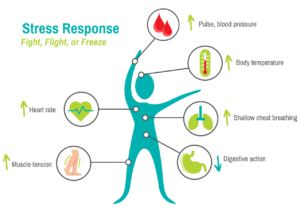Menu
Close
Stress Management: Taking Control of Your Stress
Feb 8, 2022
It may feel as though there is very little you can do about stress. Whether it’s balancing personal priorities, dealing with relationships, working around deadlines, or straining under the pressure of life’s ever growing list of responsibilities – stress will often find its way into our lives, and can certainly become overwhelming.
Luckily, we actually have much more control over our stress levels than you may have thought.
What is Stress?
Stress is a normal reaction to the demands in our lives. We become “stressed” when we feel these demands outweigh our ability to successfully cope. When our brains perceive a particular situation to be threatening, our bodies release a sudden rush of hormones that thrust us into an automatic “fight, flight or freeze” instinct. This biological phenomenon is called the “stress response.”

When your body is in this state, you may experience a variety of physical changes such as an increased heart rate, heightened blood pressure, muscle contractions, shallow chest breathing, slowed digestive action or an elevated body temperature. You may also notice changes in your emotions, or your thinking.
Why is it important to manage my stress?
In the short term, the stress response helps to protect you from danger, but if stress becomes chronic or goes unaddressed, it may have a lasting impact on both your mind and your body. Several serious medical concerns such as heart disease, high blood pressure and digestive issues have been linked to excessive levels of stress.
How can I manage my stress?
Stress is a part of our modern, fast-paced society. Although challenging, unfortunately no one is immune to it. While you do not have ownership over every element of stress, there are some important aspects we can easily take charge of.
1) Identify the sources of your stress and make strong choices
Stress originates from two main causes; either external or internal sources.
External sources are the elements in your life you cannot prevent or change, such as sitting restlessly in a bad traffic jam. The fact these types of stressors exist in our day may be out of your individual control, but you do have power over how you might respond to them, or how you let them affect you.
Try to view situations of external stress from a more positive perspective. You could fret about the traffic, or you could look at it as an opportunity to listen to your favourite music, or to enjoy some time alone in your busy day.
Internal sources on the other hand, are the choices or the decisions you make that may lead to more stress in the long run. Common sources of internal stress include procrastination, poor time management, being unprepared, setting impossible standards, or being disorganized.
Thankfully, these examples are all personal choices and therefore, we can have total control over this type of stress. The good news is, you can easily eliminate your own internal causes of stress, simply by identifying them and making choices that are the most beneficial to you.
2) Problem solve
When dealing with a stressful situation, we often focus solely on the issue. However, just stating there is a problem, doesn’t do anything to solve it. Rather than dwelling, over thinking or beating yourself-up, do some effective problem solving. Ask yourself; What can be done about it? Who can you ask for assistance? What are the alternatives or other options that are available to you? By brainstorming effective, positive solutions, you can empower yourself in regards to your stress.
3) Choose healthy coping strategies
As stress is a consistent part of our lives, it is important to utilize a variety of healthy strategies to relax. Consider the methods you currently use to manage the stress in your life. Are your coping techniques mostly healthy or unhealthy? Overall, are they helping or hurting you? Some examples of excellent healthy coping strategies to use at home include:
- Set time for yourself
- Yoga or meditation
- Decorate a room with your favorite items
- Physical activity
- Reward yourself
- Read or write
- Listen to music
- Spend time with loved ones
- Watch a movie
- Play with pets
- Garden
- Engage in new hobbies
At work it may be helpful to:
- Organize your workplace
- Mark day-timers or calendars
- Set realistic goals
- Take five minute wellness breaks
- Eat lunch away from your workspace
- Do stretching, deep breathing or muscle relaxation techniques
- Talk to colleagues
- Get fresh air
- Listen to music
- Avoid gossip
Some unhealthy coping strategies to avoid include:
- Drugs, alcohol, smoking
- Unhealthy food
- Caffeine, energy drinks
- Not talking about feelings
- Venting
- Avoiding friends/family
- Physical violence
- Taking on too much to please others
4) Ask for help
Asking for help is sometimes the hardest thing for us to do. However, it is often one of the biggest factors in reducing our stress levels. By not asking for help, you may be struggling needlessly. Instead of muddling through, or suffering in silence, seek help from a loved one, a close friend or trusted colleague.
If you feel like professional help is the way to go, talk to a counsellor, a representative from your Employee Assistance Program, or your family doctor.

Our Peer Support program services can be accessed over the phone at 403-297-1402 or through email at peer@cmha.calgary.ab.ca. We have teamed up with other Calgary agencies to help Calgarians quickly and easily access various counselling and social supports. Visit www.communityconnectyyc.ca, where you can book online for our Suicide Bereavement and Family Support Counselling, and other supports. If you prefer to still book through us, please phone (403-297-1708), or email (counsellingintake@cmha.calgary.ab.ca).
